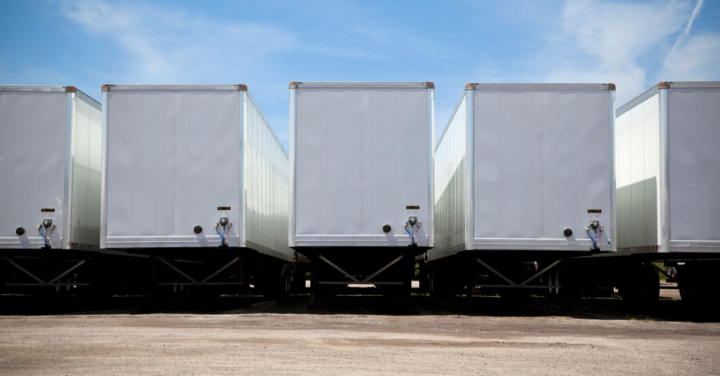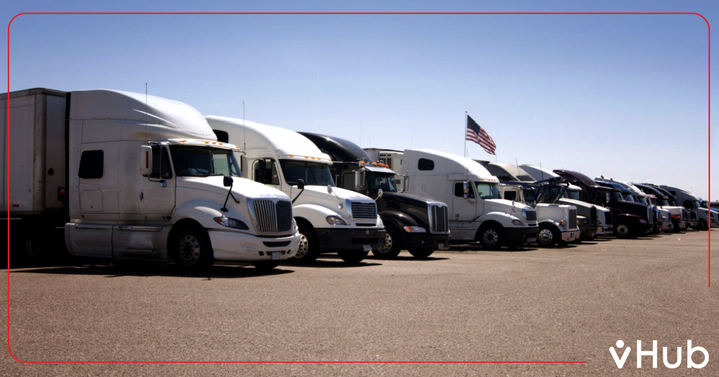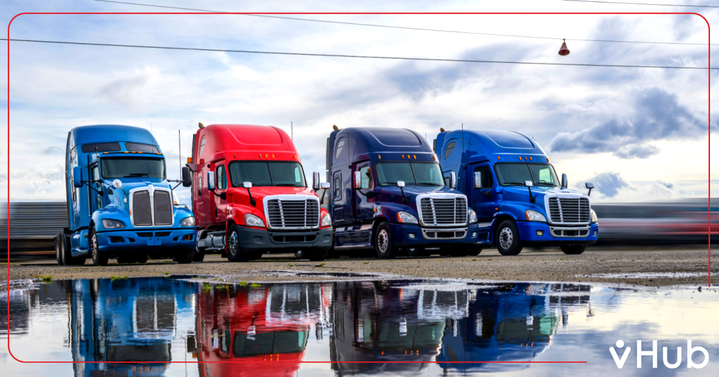If you are looking for a way to make your company more agile and ready to face unknown challenges, then building a flexible trailer pool is the right move. The slowed trailer production times and increased prices have left many logistics companies scrambling to adapt.
With changing demand and a tight capacity, active drop-and-hook networks are one way to increase turnaround time. Experts estimate around 20% of trailers sit idle at any given time.
Establishing a strong in-house trailer pool is necessary for the company that wants to stop hemorrhaging profits and increase capacity.
What is a Trailer Pool?
Shippers, brokers, carriers, owner-operators — any logistics company can create a trailer pool to help them control the flow of loads. When an asset-based company gathers a group of semi-trailers, it’s called a trailer pool.
These pools are not always made up of trailers the company owns outright. Some trailers in the pool might be leases or a partnering company’s assets. But the trailer pool owner keeps track of those assets and deploys them to increase load capacity and turnaround time.
Many semi-trailer pools create ratios of 3:1 or 5:1 trailer to a power unit (semi).
With several excess trailers for each tractor, drivers don’t have to sit around for a live load. This enables your team to keep moving at all times—but it also means trailers get left at their destinations until the unloading is finished. To keep an asset pool efficient, you need a drop lot and a plan for trailer relocation.
Why Do Freight Companies Use Trailer Pools?
Tractor-trailer pools can help streamline load flow, allowing drivers to move whenever they’ve hit a stopping point with their current load. Rather than wait around for a trailer to be ready, drivers can practice drop-and-hook runs where they drop a full trailer and hook on an empty one for the next trip.
Ideally, you can cut down on deadhead miles by assigning a gig nearby that needs to be delivered close to another job.
The uses change slightly based on the kind of logistics company controlling the asset pool:
- Shippers tend to establish trailer pools to reduce stockouts and control the number of trailers left idle at their docks.
- Brokers and carriers establish pools for more flexible fleet management and higher driver retention.
- Owner-operators use trailer pools to increase capacity and may have more leases to avoid buying excess assets.
What are the Pros and Cons of Trailer Pools for Freight Companies?
For any company, there are pros and cons to building up a trailer pool. Without the right setup, a lot of issues can come up for a traditional tractor trailer pool. Here are two lists to consider before gathering your own group of assets.
Pros of a trailer pool:
- Increases Capacity: More trailers allow your drivers to take on more loads.
- Eliminates Detention: Loading and unloading can occur without drivers present.
- Offers Shipper Flexibility: Shippers don’t have to rush because of a waiting driver.
- Solves for Port/Dock Backlogs: Trailers held up at ports or docks have less impact.
- Reduces Empty Miles: Drivers can drop and hook to reduce deadhead miles.
Cons of a trailer pool:
- Needs Upfront Investment: Buying additional trailers cost a lot and takes time.
- Takes Commitment: Investing so much requires high capacity, or you lose profits.
- Inefficiency Concerns: Idle trailers are wasting space and hurting profit margins.
- Requires Management: Trailers must be tracked and accounted for at all times.
- Increases of Empty Miles: Abandoned trailers must be repositioned for the next job.
Before innovative technology solutions, there wasn’t a great way to manage trailer pools. Now, smart sharing apps and tracking capabilities allow gathering groups of trailers for efficient asset pools. With vHub’s solution, you don’t have to own all the trailers in your pool.
How vHub’s Platform Enables a Dynamic Trailer Pool
vHub is revolutionizing how logistics companies can create, manage, and build trailer pools. Our innovative app allows you to work with other asset owners to lease trailers and assign reallocation jobs. Here are four ways vHub is changing the game regarding trailer pools and asset sharing.
vHub Provides Flexible Capacity Without the Large Investment
First, with smart trailer sharing, logistics providers no longer need to have the upfront cash it normally takes to increase their trailer pools. Rather than create a partnership with another company or commit to an asset with a purchase, owner-operators, carriers, shippers, and brokers can simply rent out the trailers they want, whenever they want them.
vHub makes it possible to pick and choose which trailers you take and how long you keep them in your pool. The rental flexibility is now streamlined, reducing the time typically spent creating agreements and doing the paperwork. vHub makes it possible to increase your capacity without any upfront investment.
vHub Offers Pricing Clarity to Plan for Profitable Margins
If you are going to rent a trailer, you want to make sure it falls well within the margins of the job you are using it for. Hidden fees or unexpected expenses can cause you to lose money on the load. Traditional leasing and rental can sometimes create confusion, making it hard to outline your expenses upfront.
vHub makes it possible to increase your semi-trailer pool with a clear understanding of how each deal will impact your job margins. You can choose to take on extra loads and easily compare the pricing to the promised payout to decide if the additional trip is worth your time.
vHub Makes it Possible to List or Lease Trailers as Needed
vHub doesn’t just allow you to bring trailers into your pool—you can also use our smart sharing platform to offer your excess assets to other logistics partners.
Why let an asset sit idle when you could be making some money through leasing options?
With vHub, you can list any extra trailers in your pool, selecting the price and available times. Trailer rental can offer a reprieve from lost profits if you are dealing with a temporary driver shortage or reduced capacity. Use vHub to list trailers that would otherwise sit idle in your pool or in a lot, waiting on reallocation.
vHub Expands Your Options to Reduce Empty Miles Consistently
Tractor-trailer pools can help reduce your deadhead miles and cause additional deadhead miles. To effectively manage your trailer pool, you need to plan for return trips and reallocations.
vHub makes it possible to create a drop-and-hook network that increases your options of nearby trailers that need to be moved to a new location—potentially lining up with your next job. Carriers, owner-operators, and brokers can use vHub to reduce empty miles. Shippers can use vHub to offer drop-and-hook solutions to incoming drivers to keep their lots and docks clear of idle trailers.
How to Create an In-House Trailer Pool
Are you ready to create a more flexible solution to help support long-term sustainability for your business? A resilient business needs to be able to adapt, and the right trailer pool setup can help you do that. Here are the steps you can take to create your own in-house trailer pool.
Assess Your Current Assets and Capabilities
It’s impossible to create a concrete strategy if you don’t know what you already have in play. Before you start working on building up your pool, you need to know exactly what you have on hand, the condition of your assets, and your potential capacity increase if you expand your pool.
Get an idea of how a trailer pool could help you increase business. Look for ways you could increase loads without increasing deadhead miles. Know what kind of trailer rental pricing is ideal and what would eliminate your profits.
Sign Up for Your vHub Account
When you are ready to increase your pool or lease out your excess assets, it’s time to get a vHub account. Using vHub, you can start exploring nearby trailer listings or create your own listing.
Within minutes, you can create an in-house trailer pool much larger than you could get by purchasing additional assets. As you grow with the help of trailer rental, you may decide you have the capacity to take on those permanent assets without the same level of investment you’d otherwise have.
Build Your Logistics Network
Create connections with other owner-operators and carriers who can participate in your network. You can use vHub to help you manage the agreements you put in place with other companies. Your network allows you to expand drivers and assets alike.
Track and Manage Your Assets
Finally, keep track of your assets and work to increase utilization rates. Without a strategy in place, your semi-trailer pool can become ineffective and wasteful. Use vHub to see where your assets are at all times and keep them in a constant rotation with your trailer pool network.
Sign up to get started with vHub today.





